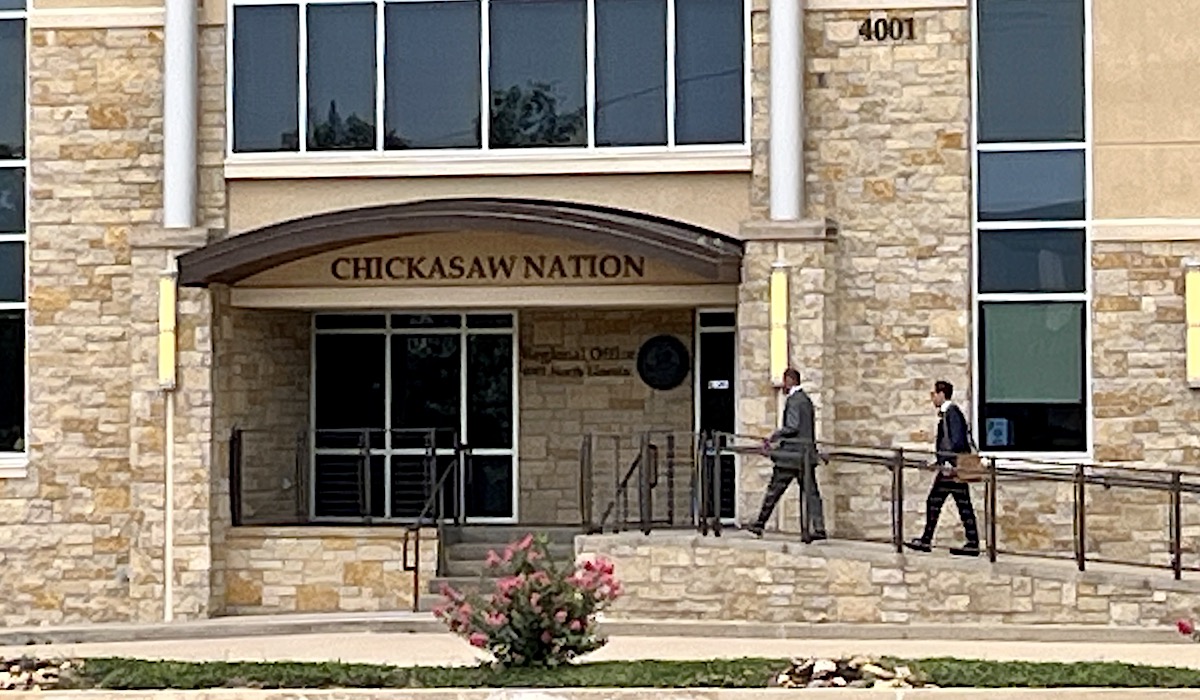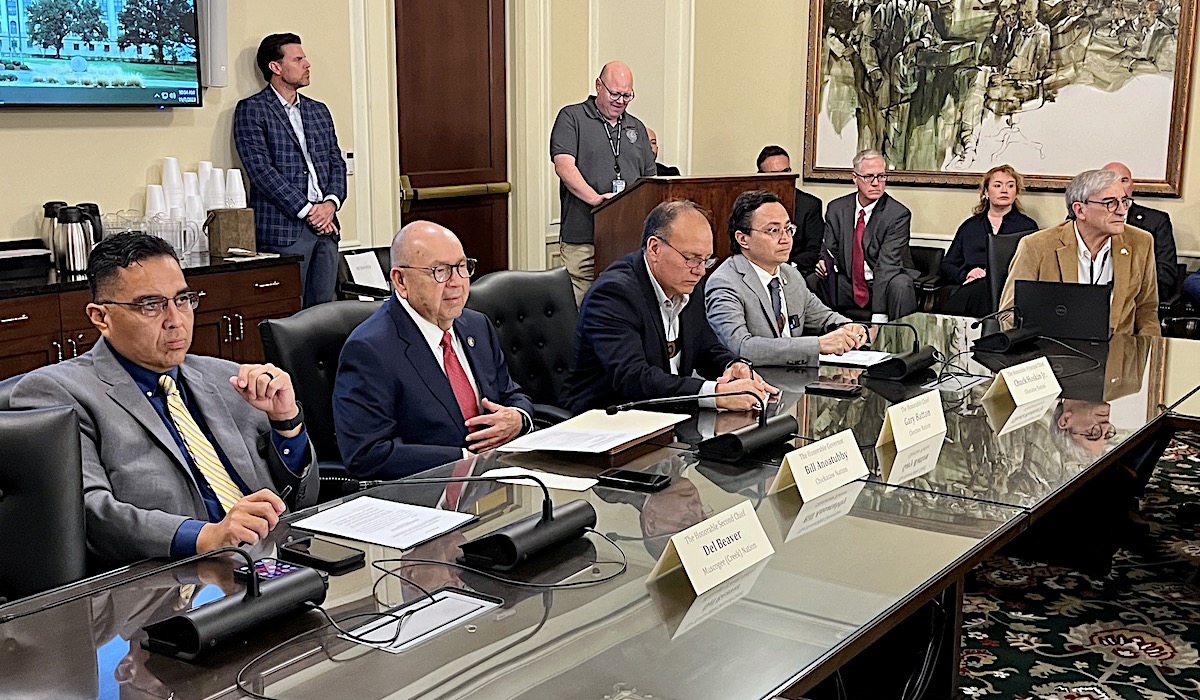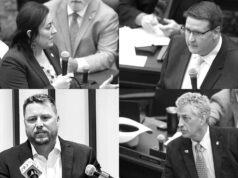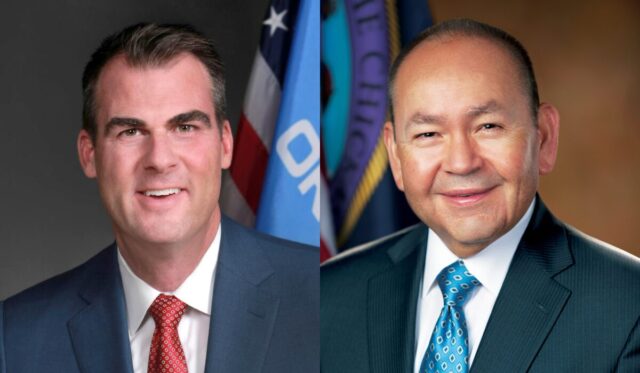

Oklahoma Gov. Kevin Stitt and Chickasaw Nation Gov. Bill Anoatubby signed compact agreements on tobacco taxation and motor vehicle registration earlier this month, culminating nearly a year’s worth of negotiations that included personal emails, meetings between representatives and a summer saga of temporary legislative extensions and veto overrides.
“In the last couple of weeks, we got really close to a deal,” said Brandon Tatum, Stitt’s chief of staff. “We consider the conversations to have been really healthy and positive, with both sides working hard to get a deal done.”
Both agreements carry 10-year terms, and the essential elements of the new motor vehicle compact did not change from the 2014 version. However, the new tobacco compact includes changes requested by both the Stitt and the Anoatubby administrations.
At Anoatubby’s request, the parties struck a unilateral termination provision that was in the 2013 tobacco compact. At Stitt’s request, the “compact jurisdiction” was changed from referencing the “nation’s Indian Country” to specifying only restricted allotment lands and Chickasaw land held in trust by the federal government.
RELATED
‘Respectful cooperation’: Stitt, Anoatubby emails precede meeting of their representatives by Tres Savage
After the McGirt v. Oklahoma U.S. Supreme Court decision in 2020 functionally affirmed the Chickasaw Nation’s territory as an Indian Country reservation — for purposes of the Major Crimes Act and potentially for civil law purposes of taxation and regulation — Stitt had requested changes to the tobacco compact jurisdiction definition that would reflect the pre-McGirt understanding of the agreement. Not doing so, Stitt argued, could greatly expand the land on which tobacco could be sold by tribes under different taxation rules.
Anoatubby agreed to that adjustment in email correspondence last year, but Stitt asked for additional clarification that the compact agreement could not be used by either party to craft arguments in litigation over civil jurisdiction questions, namely the Stroble v. Oklahoma Tax Commission case about whether the state has jurisdiction to tax the income of tribal citizens who live and work within reservation boundaries.
That request appears to have been honored in Article II, Section 1A of the Chickasaw Nation’s new tobacco compact:
No provision of this compact shall be deemed an admission relevant to any matter outside of its express terms, nor shall any of those terms be invoked for any purpose not relating to the nation’s retail sale of tobacco products within the compact jurisdiction.
Other changes include specification that the new tobacco compact shall automatically renew for another 10-year period on Dec. 31, 2034, unless one party provides written notice seeking termination within 180 days of that date. The parties are allowed to renegotiate or modify the compact with mutual agreement at any time.
The new tobacco compact maintains the existing split of tobacco taxation collected at the wholesale level, with 50 percent going to the state and 50 percent going to the nation, a division questioned last year by some senators who argued that tribal establishments likely sell far more than 50 percent of their tobacco products to non-natives.
The new tobacco compact concludes with slightly modified general provisions, including a broadened recognition of each party’s sovereignty from governmental interference:
Nothing in this compact shall be deemed to authorize the state or nation to regulate the other’s government or to interfere in any way with the other’s election of its governmental officers. This compact shall not alter tribal, federal or state civil adjudicatory or criminal jurisdiction.
Tobacco taxation compacts between Oklahoma and tribal nations are necessary because federal law exempts tribal citizens from paying state excise or sales taxes on tobacco products purchased on Indian Country land as defined by 18 U.S.C. 1151.
Federal law also allows states to tax non-tribal citizens who buy tobacco from tribal businesses in Indian Country. There are 38 federally recognized tribes headquartered in Oklahoma, and a 1991 landmark U.S. Supreme Court case — Oklahoma Tax Commission v. Citizen Band Potawatomi Indian Tribe of Oklahoma — affirmed states’ rights to tax non-tribal citizens who purchase tobacco on tribal land.
The state’s new compact with the Chickasaw Nation could spur similar agreements with other tribes whose tobacco compacts have either expired or been extended one additional year last summer by the Oklahoma Legislature.
“We’re hopeful for that,” Tatum said.
However, unlike the Chickasaw Nation’s compact on motor vehicle registration, some other tribes’ existing license tag compacts include different terms that have drawn concern from the Stitt administration about real-time access to tag and owner information for public safety and turnpike purposes.
Stitt, Anoatubby deal ‘a step in the right direction’
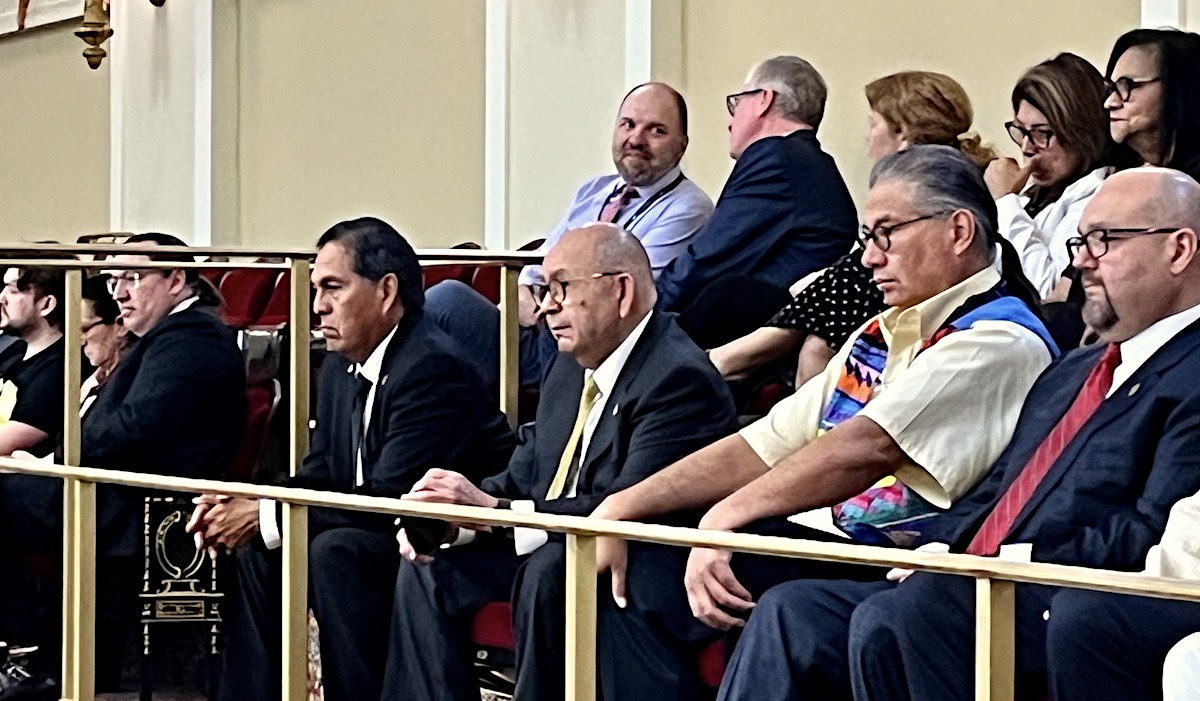
Interestingly, the significant agreements between Stitt and Anoatubby — their first during a five-year period of general political animus — were not announced by either of their offices. Instead, Oklahoma State Senate President Pro Tempore Greg Treat released a statement at noon Saturday praising the agreements and linking to the documents.
“This is a major win for the state of Oklahoma and our tribal partners,” said Treat (R-OKC) . “It also highlights the importance of the progress we can make as a state when we work together. I applaud everyone involved, including Chickasaw Nation Gov. Bill Anoatubby and Gov. Stitt, who negotiated these compacts.”
Treat referenced the elongated 2023 sessions of the Oklahoma Legislature, which featured stops, starts, vetoes and overrides of bills extending the existing tobacco and motor vehicle compacts. Treat balked when House leaders surreptitiously revealed and tried to advance five-year extensions of the compacts. He agreed to bills extending the compacts through Dec. 31, 2024, and he called senators back twice in July to override the vetoes of Stitt, who claimed his negotiations with the the tribes would be stronger if Dec. 31, 2023, loomed as a deadline.
“Without our action, I do not believe this would have come to fruition,” Treat said. “These agreements with the tribes bring in millions of dollars to the state annually and go toward essential services that benefit all Oklahomans. This is a step in the right direction and something I hope we can build on moving forward while fostering positive relationships with our tribal partners.”
Treat, however, stated publicly that he did not think Stitt’s concern about the “compact jurisdiction” language referencing Indian Country was relevant, despite numerous unanswered legal questions about the extent to which the Five Tribes’ reservations are Indian Country for civil law purposes.
RELATED
Seeking ‘a path forward,’ House members study history, future of state-tribal compacts by Tres Savage
Nonetheless, Anoatubby agreed to Stitt’s requested change to the definition of “compact jurisdiction,” furthering his legacy of striking deals between tribes and the state during his 40 years in office.
Senate Floor Leader Greg McCortney (R-Ada) also released a statement about Stitt and Anoatubby finally striking a deal.
“First and foremost, I want to share my appreciation for Gov. Stitt and his team for their efforts to negotiate and enter the tobacco and vehicle tag compacts with the Chickasaw Nation, one of our state’s largest and most economically diverse tribal nations,” McCortney said. “These agreements show promise that our state-tribal relations are moving in a positive direction and offer hope that we’ll see more tribes signing compacts soon.”
The new agreements come two months after a House interim study highlighting the history of state-tribal compacting and looming questions about criminal and civil jurisdiction in eastern Oklahoma.
“Oklahoma’s economy, services, infrastructure, and most importantly, our people, will benefit as we continue to work with our tribal partners and leaders,” McCortney said.
Stitt, Anoatubby, Drummond issue statements
Late Monday, both Stitt and Anoatubby released statements about the new compacts.
“We now have fully executed tobacco compacts with both the Chickasaw and the Apache tribes that maintain jurisdictional continuity in Oklahoma,” Stitt said. “We also finalized a car tag compact with the Chickasaw tribe that ensures Oklahoma law enforcement can confidently identify vehicles on the road and guarantees that our turnpikes can read tribal tags. For the safety of all law enforcement, and for tag compacts to be workable, the state must have uninhibited, up-to-date access to driver registration information, and this agreement ensures that.
“While I’m glad we could come to an agreement on these compacts, I still believe there is work to be done to ensure we are not further eroding Oklahoma’s revenue base in order to continue to provide public services to people across the state. I continue to welcome other federally recognized tribes in Oklahoma to engage with my office in the compacting process.”
Anoatubby said the new agreements “built on areas of agreement” without waiving any rights or legal arguments on other matters.
“The Chickasaw Nation is pleased to announce we have worked with Gov. Stitt’s office to continue these important compacts for another 10 years. We built on areas of agreement without waiving or limiting the rights of either party or requiring either party to yield on matters where there may still be legal dispute,” Anoatubby said. “We appreciate the Oklahoma Legislature providing us additional time to work on these agreements. It has long been our policy to exercise sovereignty and pursue sound intergovernmental agreements. This work, done properly, strengthens the Chickasaw Nation and Oklahoma. We believe our new agreements are good examples of what can be done when we work together, and we are glad they will benefit all of us who call Oklahoma home.”
Oklahoma Attorney General Gentner Drummond also released a statement.
“I have been critical of the governor on his past dealings with the tribal nations of Oklahoma, but his recent negotiations with the Chickasaw Nation and Apache Tribe to secure sound tobacco compacts and renewal of a successful license tag compact merits praise,” Drummond said. “I commend his efforts with Gov. Bill Anoatubby and Chairman Durell Cooper, who likewise deserve recognition for their exemplary leadership.”
(Update: This article was updated at 9:15 a.m. Sunday, Jan. 21, to clarify a reference to taxation rules regarding tobacco. It was updated again at 11 a.m. Wednesday, Jan. 24, to include statements released by Stitt, Anoatubby and Drummond.)









